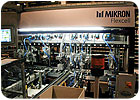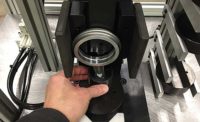
Mega Pumps LP (Eatontown, NJ), a subsidiary of MegaPlast GmbH (Villngen-Schwenningen, Germany), manufactures airless metered pump dispensers used in the medical device and cosmetics industries.
Established in 2000, the company initially had trouble keeping pace with the standards of its parent company in terms of quality and efficiency. For example, its assembly processes required more employees and experienced far longer changeover times between product types than in Germany. The company’s multiple assembly stations, which run 24 hours a day, five days a week, were also inefficient in terms of use of space.
“The [assembly function] was made up of separate stations stretched out over a large footprint, which made loading and running a much more labor intensive operation than we wanted,” says Mega Pumps operations manager John Murtagh, summing up the situation.
To fix these problems, Mega Pumps implemented a series of standardized Flexcell automated assembly modules from automated equipment manufacturer Mikron Corp. (Aurora, CO). The result was lower labor costs, a substantially reduced footprint and dramatically reduced changerover times. Because the company also has a number of Mikron units at work in Germany, it is now better able to compare process performance across multiple facilities.
“It made sense to try to keep the same continuity of machinery between sister companies,” Murtagh says. “We like to impress on our customers that we use the exact same tooling and assembly equipment as well as raw material. By using the same assembly, we get a little more maintenance technology, we get better at what we do, and we get acquainted with one source of equipment.”
In addition to assembling the pumps, the new system performs a series of quality and functional checks to ensure each pump has been correctly manufactured before it is shipped to the customer. The tests also help operators identify and correct any process problems that might crop up during production.
“The 100 percent function test is a nice feature. We know the dispensers are all functionally correct,” Murtagh says. “Time is always money. But it doesn’t pay to make an inferior product quickly.”
Murtagh adds that the system controller doesn’t just keep track of defect rates, but pinpoints exactly where any defects might be occurring, making them that much easier to fix. Because each assembly station is built on a standardized frame from largely standardized parts, stocking and replacing worn components is much easier than it would be with a highly customized system.
For more on automated assembly, visitwww.mikron.comor call 303-364-5222.


